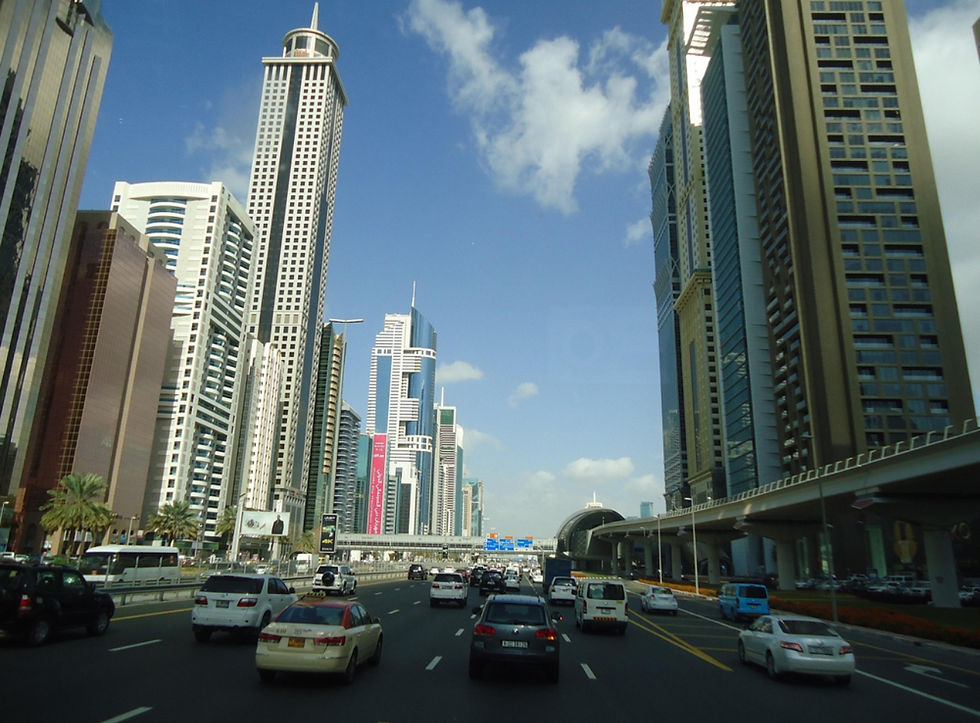Dubai Awards Major Road and Bridge Upgrade Contract for Al Qudra Corridor
- Michael Ghobrial

- May 21, 2025
- 4 min read

Dubai Awards Major Road and Bridge Upgrade Contract for Al Qudra Corridor
Dubai’s Roads and Transport Authority (RTA) has recently awarded a major contract to upgrade the Al Qudra Street corridor – a project set to significantly enhance the city’s road network. Valued at approximately AED 798 million, this newly signed contract appoints a lead construction firm to deliver extensive road widening and bridge works. The upgrade is designed to improve traffic flow, reduce congestion, and accommodate the rapid growth in residential communities along the route. Officials confirm that once complete, the project will dramatically cut travel times for commuters and bolster connectivity across several fast-growing neighborhoods.
Dubai’s busy Sheikh Zayed Road, lined with skyscrapers, exemplifies the scale of the city’s transport infrastructure. The Al Qudra corridor upgrade is part of Dubai’s broader push to modernize roads and bridges in line with its urban expansion. In this massive development, multiple new overpasses and widened highways will streamline traffic between key districts. As a result, residents and visitors can expect shorter journeys and improved access to emerging communities on the city’s outskirts.
Project Scope and Features
Under the new contract, the appointed contractor will expand Al Qudra Street by roughly 11.6 km and construct a series of major bridges totaling about 2.7 km in length. These upgrades focus on key intersections along the corridor. For example, at the junction of Al Qudra Street with the road linking Arabian Ranches and Dubai Studio City, a new 600-metre flyover (four lanes in each direction) will eliminate a notorious bottleneck. This single improvement is expected to boost that intersection’s capacity from handling 6,600 vehicles per hour to over 19,000 vehicles, slashing average wait times by more than half. Further along the route, the intersection with Sheikh Zayed bin Hamdan Al Nahyan Street will be rebuilt with a 700-metre bridge featuring seven lanes each way, plus new two-lane ramp merges, ensuring seamless transfers without disrupting mainline traffic. Additional elevated ramps of 500 metres and 900 metres will funnel traffic from Al Qudra Street toward Jebel Ali and toward Downtown Dubai/Dubai Airport, respectively. The project also introduces about 3 km of new service roads parallel to the upgraded highway, enhancing local access to adjacent developments.
All these enhancements are geared toward dramatically increasing road capacity and safety. Upon completion, officials estimate the average trip along this corridor will shrink from about 9–10 minutes to under 3 minutes. The expanded interchanges and new bridges will remove several traffic lights and conflict points, allowing free-flowing movement through what used to be congested junctions. In total, the upgraded Al Qudra corridor will directly serve an estimated 400,000 people living or working in communities like Arabian Ranches, Motor City, Studio City, Mudon, DAMAC Hills, and the new Town Square development. By alleviating choke points, the project will not only save time for motorists but also improve road safety standards and support economic activity in these growing suburbs.
Timeline and Infrastructure Impact
The Al Qudra Street development is a centerpiece of RTA’s ongoing transport infrastructure plan for 2024–2027. Construction on this upgrade is slated to begin shortly, with major works expected to span the next few years. Project completion is targeted within a roughly two-year timeline, aiming to have the new bridges and expanded roadway fully operational by 2027. This timeframe aligns with Dubai’s strategic roadmap of accelerating infrastructure delivery to keep pace with population growth. Importantly, the Al Qudra improvements form part of a broader AED 16 billion master plan that includes 22 road projects across the emirate. This holistic approach means the benefits of the Al Qudra upgrade will be amplified by other concurrent projects – such as new highway links, upgraded interchanges, and public transport enhancements – all working in synergy to improve mobility citywide.
From a transport planning perspective, the significance of this contract and project cannot be overstated. It provides critical East-West connectivity, effectively creating a high-capacity corridor that parallels other major routes like Umm Suqeim Street and the Expo Road. By connecting Sheikh Mohammed bin Zayed Road (E311) to Emirates Road (E611) with uninterrupted flow, the upgraded Al Qudra route will divert traffic from more crowded central highways and offer alternative paths for commuters. This will relieve pressure on the city’s primary north-south arteries and distribute traffic more evenly across the network. In the long term, the reduced congestion and faster travel will contribute to lower vehicle emissions per trip and fuel savings, supporting Dubai’s sustainability and quality-of-life goals. Overall, the project exemplifies Dubai’s commitment to proactive infrastructure investment – ensuring that roads and bridges are expanded ahead of demand to support new housing developments, leisure destinations, and economic zones taking shape in the Al Qudra area.
Companies Involved
Roads and Transport Authority (RTA), Dubai – Government client overseeing the project and funding the road upgrade as part of its strategic infrastructure plan.
Wade Adams Contracting – UAE-based construction firm appointed as the main contractor to execute the Al Qudra Street development project, responsible for delivering the bridges, road works, and associated improvements.
Conclusion
This major road and bridge upgrade stands to greatly enhance local transport infrastructure in Dubai. By appointing a capable contractor and outlining a clear plan, the RTA is delivering a solution that addresses current congestion and anticipates future growth. Residents of emerging communities around Al Qudra Street will soon enjoy quicker commutes and safer journeys, while Dubai as a whole benefits from a more resilient and efficient road network. In essence, the Al Qudra corridor project is not just about laying asphalt and concrete – it’s about connecting people and places more effectively, supporting the city’s expansion, and keeping Dubai moving toward its vision of seamless mobility.









